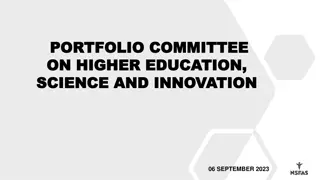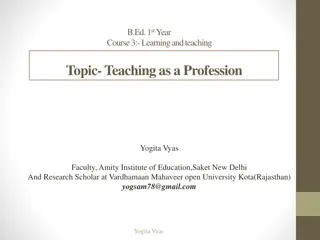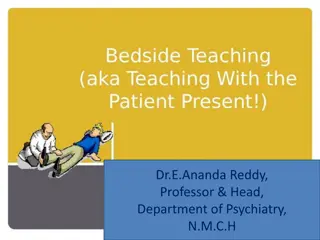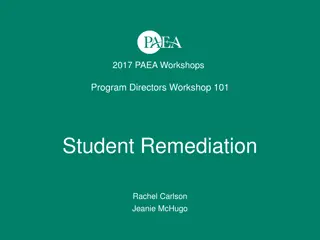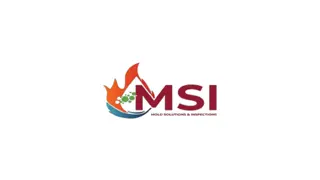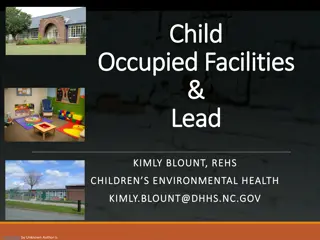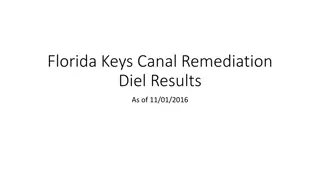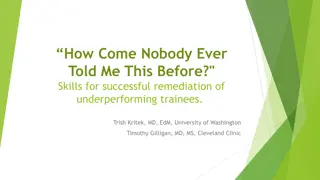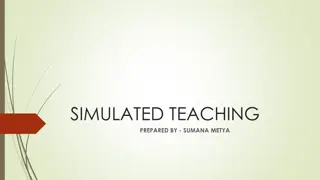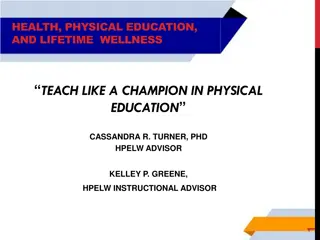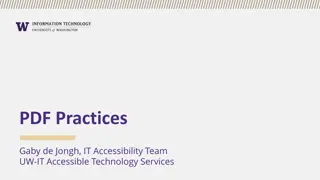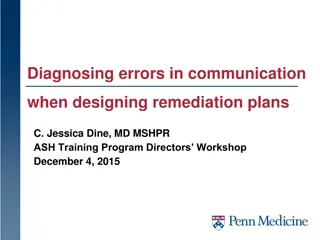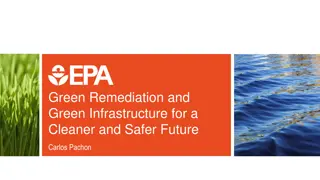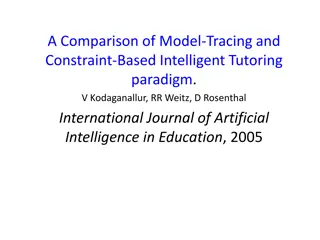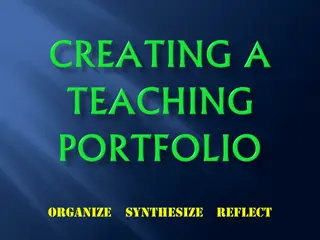Strategies for Effective Teaching and Remediation in Education
Explore the education process, teaching methods, and remediation strategies in the field of psychiatry and behavior sciences. Learn how to identify learners needing remediation, diagnose deficits, create remediation plans, and assess effectiveness. Dive into group discussions, review experiences, teaching frameworks, and engage in case studies for practical application.
- Teaching strategies
- Remediation techniques
- Psychiatry education
- Learning assessment
- Skill development
Download Presentation

Please find below an Image/Link to download the presentation.
The content on the website is provided AS IS for your information and personal use only. It may not be sold, licensed, or shared on other websites without obtaining consent from the author. Download presentation by click this link. If you encounter any issues during the download, it is possible that the publisher has removed the file from their server.
E N D
Presentation Transcript
The Education Process: Teaching and Remediation Heidi Combs MD, MS Associate Professor, University of Washington, Department of Psychiatry and Behavior Sciences Jesse Markman MD, MBA Assistant Professor, University of Washington, Department of Psychiatry and Behavior Sciences
Objectives: At the end of this talk the participant will be able to: Determine if a learner exhibits a problematic pattern of behavior that warrants remediation. Diagnose the deficit domain: knowledge, skill, or attitude Jointly formulate a remediation plan with the learner Create a schedule for follow up to assess effectiveness of the remediation plan
Outline of session Group discussion regarding their session goals Review groups remediation experiences- successes and failures Review of teaching framework Review of remediation framework Pair work on a case of their own or a case provided Report out on pair activities Wrap up
Your remediation stories Good? Bad? Ugly?
A quick review: How To Teach
Key Steps to Teaching Effectively Follow-up Expectations Engagemen t Feedback Assessmen t
Expectations Expectations are the basis of performance No one likes to not know what they should be doing Set expectations at the beginning of the rotation and refresh them often If the expectations are not known by the learner, feedback will feel unsubstantiated
Expectations are the basis of performance Low Beget High Performance Expectations Beget Low Performance High Expectations
Experienced based learning gives the best retention Recall requires experience: Told and Shown Told, Shown, Experienced Told Recall (3 weeks) 70% 72% 85% Recall (3 months) 10% 32% 65% And Practice Whitmore, J. (2009). Coaching for Performance. London: Nicholas Brealey Publishing.
Create An Enabling Environment Learners Will Learn And Function Best When Learners have compelling direction Learners have an enabling structure Learners have a supportive context Learners have expert coaching Hackman, J. Leading Teams. 2002. Harvard Business School Publishing Co. Boston. Dutton, J. Energize Your Workplace. 2003. John Wiley & Sons, Inc. Hoboken, NJ.
Matching learner states to teaching styles Teacher styles Authoritative Motivator/ facilitator Delegator Dependent learner Match Resident will get mired in the details Resident will feel lost Learner stages Interested learner Resident will not self elevate to self direction Match Resident will not feel supported Self- directed learner Resident feels micromanaged Resident will not benefit from the motivation of ownership of tasks Match Grow. G. Teaching learners to be self directed. Adult Educ Q 1991;41:125-129
Matching learner states to teaching styles As a learner progresses there is often a shift from dependent to interested to self-directed Too much of a mismatch can be defeating but a degree of mismatch can be positive.
Assessment Helps the teacher know where the learner is at and what the learner needs so teaching styles can be adjusted Helps the teacher determine what sort of deficits are present so appropriate feedback can be given
Assessments flow from expectations Set expectations at the beginning of the night and refresh them often If the expectations are not known by the learner, the feedback based on the assessment will feel unsubstantiated Assess multiple events Everyone has good and bad moments recognize patterns Write down notes of what you thought at the time
Challenges with assessments We tend not to distinguish between items- if a learner performs well in one area we tend to assess them well in other areas (halo effect) Personality traits (e.g. extroversion, introversion) may have a positive or negative impact on our assessment Turnbull J., Van Barneveld C. Assessment of clinical performance: in-training assessment. In: Normal GR, van der Vleutem CPM, Newble DI editors. International handbook of research in medical education. Dordrecht, Netherlands:Kluwer Academic Publishers, 2002;793-810
What Is Feedback? Feedback is the constructive and objective appraisal of performance given to improve skill Formative feedback: An appraisal of the skills demonstrated in the here and now Purpose: Improving specific skills Feedback should be specific, objective, and direct Summative feedback: A general appraisal of overarching skills and abilities Purpose: Assessing competency, document achievement Feedback is more general, but should have specific situations and occurrences which support both positive assessments and areas for suggested improvement Bienstock, J. et. al. To the point: medical education reviews providing feedback. American Journal of Obstetrics & Gynecology 2007;508-513.
Feedback flows from assessment Assessment is the opportunity to consider the stage and progress of the learner. It flows naturally once expectations are set Feedback is the opportunity to turn an assessment into a vehicle for growth for the learner
Why Is Feedback Important? Feedback is essential to accurate self appraisal of skills and improvement on skills Without feedback, alternative feedback is created by the learner and other assessments are overvalued Memory is valued over clinical skill Physicians significantly overvalue their current skill level and give poor self assessments Without feedback, no one gets any better Bing-You, R., Trowbridge, R. Why Medical Educators May Be Failing at Feedback. JAMA 2009;302:12:1330-1331.
Giving Feedback Ask for self assessment Ask the learner what went well Ask the learner what could be improved Give your assessment Describe what you noticed that went well Reinforcing positives is just as important as identifying areas for improvement Describe things you think could be improved Couch this in the experience of the learner to demonstrate the value to the learner Make sure to allow the learner to comment on the feedback If the learner does not buy into the feedback provided, they will not hear what you have said and are less likely to apply the information Make an action plan Bienstock, J. et. al. To the point: medical education reviews providing feedback. American Journal of Obstetrics & Gynecology 2007;508-513.
Giving feedback Be fair Be specific Be consistent Be constructive Be timely Be flexible Be open Be collaborative Do it in an appropriate setting Psychiatric Residents As Teachers: A Practical Guide Second Revision Committee on Graduate Medical Education 2001-2002
When to defer When strong emotions are involved When you are hearing about something secondhand and have not yet had an opportunity to investigate
Change your mindset about feedback Feedback often should take less than 5 minutes!! It is more valuable to give feedback snippets along the way! It is not helpful to hose them down at the end!
Steps in Remediation Step 1: Determine if remediation is needed Step 2: Diagnose the deficit domain(s) Step 3: Jointly build a remediation plan Step 4: Set your plan for follow-up
Step 1: Determine if there is a problem
Yes Houston, There is a problem: Now what?
Step 2:Identify domain deficit Knowledge Skills Attitude
Knowledge If a learner doesn t know what is going on or what he or she should be doing, it s hard to get it right You may find yourself surprised that a learner is unaware, but this may be reality If these deficits are present, it may indicate a need to : Assess your own orientation and what is being retained Set more specific expectations and assess for understanding expectations
Skills If a learner doesn t know how to do what he or she should be doing, it s hard to get it right Learner skill sets vary considerably Rotations vary The level of exposure at different sites varies Learners vary in their ability to acquire new skills The presence of skill in one area does not necessarily translate to another area/skill/situation
Stages In Acquiring Skills Awareness Unconsciously Incompetent Consciously Incompetent Learning Unconsciously Competent Consciously Competent Practice Peyton JWR. The learning cycle. In Peyton JMR, editor. Teaching and learning in medical practice. Rickmansworth, UK: Manticore Europe Limited, 1998:13-19
Attitude The learner knows what to do and how to do it, but chooses not to Most difficult area for most people to address Assessment starts with understanding where your learner is coming from
Learner Do you remember what it was like to be a medical student or resident? Where are they coming from?
Supplemental Assessment Sometimes the issue is actually more about our own interaction or experience of the learner than the learner it s not you it s me no really... Part of the assessment also needs to consider yourself with the learner How is this making you feel? What is bothering you about this? What do you want or need?
Supplemental Assessment Sometimes students are irritating or annoying What is annoying you? What is annoying about the thing that is annoying you? Is this objectively irritating? It is entirely appropriate to conclude that the student needs to annoy you less to be successful, but you want to be clear that this is part of the equation
Remediation Plan Step 1: Determine if remediation is needed Step 2: Identify the deficit(s) domain Step 3: Build a remediation plan Step 4: Set your plan for follow-up
Key Remediation Plan Features Dependent on deficit Created collaboratively with learner and supervisor Delineation of clear expectations (for all parties): What needs to change and how will it be assessed/measured? Create timeline
Remediation Plan Step 1: Determine if remediation is needed Step 2: Identify the deficit(s) Step 3: Build a remediation plan Step 4: Follow-up based on plan!
Step 4: Set your plan for follow-up How will you know if this plan is successful? When will you follow-up with the learner? Having a plan for follow-up and measurement of success helps all sides see growth and progress Validates the learner Allows the teacher to adjust aspects if needed Without follow-up, your plan will lose momentum quickly and easily
Small Group Case Practice Break into pairs Select a case that is vexing you or vexed you in the past. Work through the case using the Remediation Tool You may need to make an educated guess for some of the information if it is a situation that is evolving
Post activity discussion In historic cases had you followed the steps? Any sticking points? Any patterns?
Take home points Remediation is most successful when developed in a structured way through a collaborative partnership Being familiar with the key steps of teaching can help with identifying if there is a problem and what it might be Don t wait too long or the window of opportunity closes


